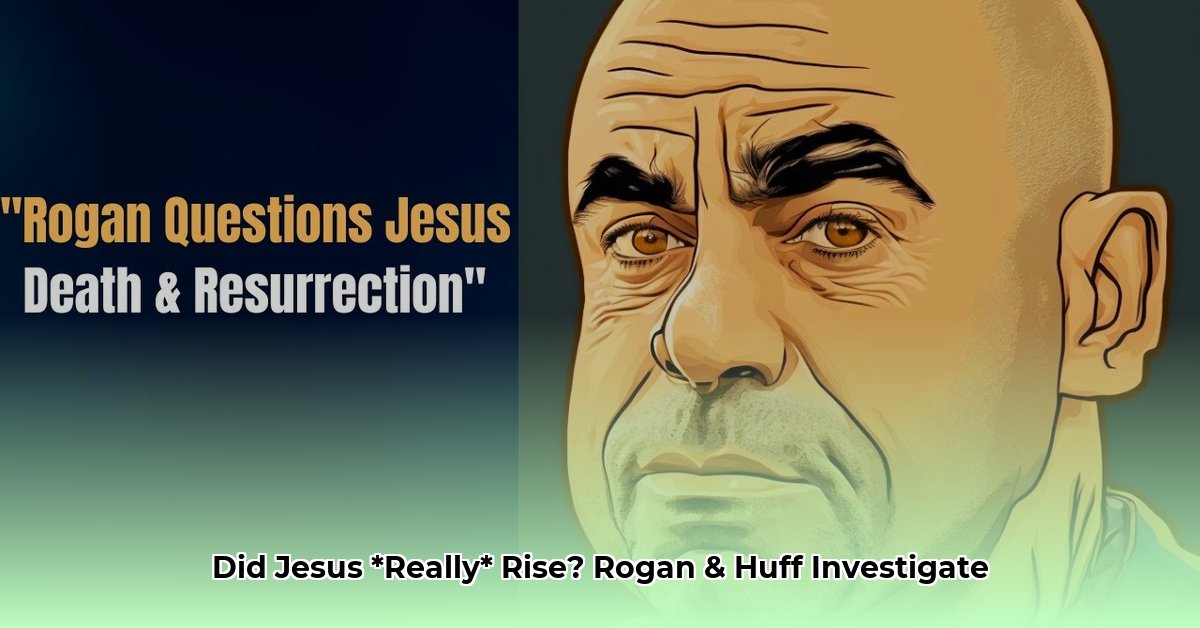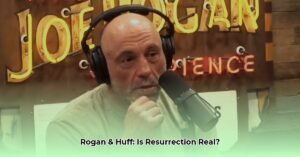In a thought-provoking episode of The Joe Rogan Experience (#2252), host Joe Rogan engaged in a spirited discussion with Christian apologist Wesley Huff about the resurrection of Jesus Christ. This episode, a departure from Rogan’s typical political commentary, delved into the intersection of faith, history, and scientific skepticism, sparking a debate that resonated with listeners. This article provides a comprehensive analysis of their conversation, exploring the core arguments, underlying assumptions, and broader implications of their exchange.
Rogan’s Skepticism and the Modern Medical Analogy
Rogan, known for his inquisitive nature and willingness to challenge conventional wisdom, expressed skepticism about the traditional resurrection narrative. He anchored his doubts in a contemporary anecdote – a story about an individual revived after being declared dead and nearly subjected to organ harvesting. This modern medical marvel served as a springboard for Rogan’s central question: Could Jesus’s apparent resurrection be a similar case of misdiagnosed death, rather than a divine miracle? He suggested that perhaps, in the absence of modern medical understanding, Jesus’s survival might have been interpreted as a supernatural event.
Rogan also questioned the plausibility of surviving Roman crucifixion. Acknowledging the brutality of this ancient execution method, he struggled to reconcile the historical accounts of Jesus’s post-crucifixion appearances with the likely physical state of a crucifixion survivor. This line of questioning reflected a scientifically-minded approach, emphasizing the need for tangible evidence and a plausible, explainable narrative.
Huff’s Defense and the Historical Context of Crucifixion
Huff countered Rogan’s skepticism by providing crucial historical context. He meticulously detailed the gruesome realities of Roman crucifixion, emphasizing the extreme physical trauma inflicted upon the victim. He argued that surviving such an ordeal would be highly improbable, and appearing healthy and active just days later would be virtually impossible. Huff challenged Rogan’s modern medical analogy, suggesting that it failed to account for the sheer savagery of crucifixion and the extent of the injuries Jesus would have suffered.
Furthermore, Huff underscored the significance of the resurrection within Christian theology. He emphasized its centrality to the faith and highlighted historical accounts of Jesus’s post-crucifixion appearances, presenting them as evidence supporting the resurrection narrative. He argued that these accounts, regardless of one’s personal beliefs, warrant consideration as historical documents.
A Clash of Worldviews: Empiricism vs. Faith
The Rogan-Huff exchange transcended a simple debate about historical facts; it represented a fundamental clash of worldviews. Rogan, approaching the topic through a lens of empiricism and scientific skepticism, sought tangible evidence and a rational explanation. Huff, speaking from a faith-based perspective, emphasized the role of belief and the possibility of events that defy scientific understanding. This contrast highlighted the ongoing tension between faith and reason, a tension that continues to shape discussions about religion and spirituality.
Key Arguments and Points of Contention
| Argument | Rogan’s Perspective | Huff’s Perspective |
|---|---|---|
| Resurrection | Possibly a misinterpretation of survival, similar to modern instances of revival after declared death. | Highly improbable given the brutal nature of Roman crucifixion. Survival and subsequent recovery would be nearly impossible. |
| Historical Accounts | Could be influenced by faith and lack precise medical detail. | Important pieces of historical evidence supporting the resurrection narrative. |
| Crucifixion | Acknowledges brutality, but questions the certainty of death. | Emphasizes the extreme trauma and the unlikelihood of survival. |
The Organ Harvesting Analogy: A Thought Experiment
Rogan’s analogy between the near-fatal organ harvesting incident and Jesus’s crucifixion served as a thought experiment, not a definitive argument against the resurrection. It highlighted his willingness to explore alternative explanations, even for events traditionally attributed to divine intervention. This approach, while potentially challenging to those with strong religious convictions, encouraged listeners to critically examine their own beliefs and consider different perspectives.
Rogan’s Evolving Spirituality: A Nuanced Perspective
Interestingly, Rogan’s questioning wasn’t rooted in outright rejection of spiritual concepts. He expressed a growing openness to the idea of a soul and acknowledged the limitations of scientific understanding. This nuanced perspective, combining skepticism with a sense of wonder, added complexity to the conversation, moving beyond a simplistic binary of belief vs. disbelief.
Unanswered Questions and Further Exploration
The Rogan-Huff discussion didn’t provide definitive answers, but it sparked important questions: How accurate were ancient methods of determining death? How might cultural and religious beliefs have influenced interpretations of these events? What constitutes “proof” in such cases? These unanswered questions highlight the limitations of historical inquiry and the enduring mysteries surrounding the life and death of Jesus. They also underscore the importance of ongoing research and open dialogue, even – or perhaps especially – on topics as sensitive and complex as the resurrection.
[Image of Joe Rogan]
[Image of Wesley Huff]
[Optional: Link to JRE #2252]
[Optional: Link to relevant research on Roman crucifixion]
[Optional: Link to resources on Christian apologetics]







